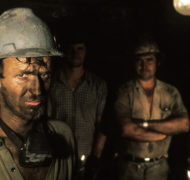Rooted: Loyalty to a Way of Life
Blog / Produced by The High Calling
My mother’s father was a coal miner—a hard-drinking man with rough hands who laughed easily and loved children. Mining was hard work, and sometimes dangerous, but it paid a fair wage. That was something a man with little education and a growing family in rural West Virginia could appreciate. His daddy farmed to feed his family; now that same land would give provision in a different way.
For my grandfather, this land where I now live was about more than making a living. It was a way of life. A way of life that has been slowly seeping away.
Mechanization in the 1950s and 60s changed the face of coal mining all across Appalachia. Thousands of miners lost their jobs and left the region. As the economy and industry shifted, the population declined further in the 1980s. Once-thriving mining communities became ghost towns as young families left in search of livelihood.
Bodies broken from years of hard labor became dependent on prescriptions to get through the day. Others self-medicated to forget the pain of their bodies and the emptiness of unemployment.
Gradually, the way of life the land gave us began to fade from our memories. Hollows once blossoming with carefully-tended homes and gardens became darker places. Lonely places.
But still, there are those who chose to stay. They stayed because they are rooted deeply here. Rooted deeply in a land that has given back to its people in more ways than can be named. And they remember the old ways.
My grandfather stayed. He stayed and pieced together a living as best he could. Life was different, but he was home. This land had been faithful to his family for generations.
In April of this year, Harlan County, Kentucky, hosted a conference for people concerned about the changing economy in Appalachia. Attendees of the three-day Appalachia’s Bright Future gathering heard stories of people from other regions that have gone through similar economic transitions. One such person was Brendan Smith, a former cod fisherman from Newfoundland.
“Economic transition is about much more than bringing in jobs,” Smith said. “ … When the cod grounds shut down, what they did was offer us money. They’d send us a check, we’d beach our boats … We took the money but what we did was lose our sense of purpose. What you find in Newfoundland now is, a fisherman gets a check, buys a brand new beautiful truck and gets up at five in the morning to drive down to the docks and drink himself to death while he wishes he was out fishing.
“Work has to be about so much more than making a paycheck,” Smith went on to say. “Fishermen, coal miners, iron workers … we’re just proud of building, powering, feeding this whole country. So, just transition plans not only have to help us feed our families but also feed our souls.”
I think of my grandfather as I walk beside the creek with my children. I don’t know what it was about this land that fed his soul. The curves of these hills move differently inside of me. As I watch my boys skip rocks from the bridge, I wonder if Grandpa’s loyalty was not so much to the work of the land as it was to the slow pace of life this land engenders. To family and the deep relationships that grow in these hills.
I gaze down at swift-moving water slipping over smooth stones and wonder if my grandfather knew that his choice to stay would bring me where I am today … walking beside my two boys in a neighborhood that stands on a former cow pasture.
Home.
In this New York Times video, residents of McDowell County, W. Va., share memories and hopes for their rural community—in jeopardy because of high unemployment and an exodus of young people. Mobile users can view the video by clicking here.
EDITOR'S NOTE: This article was originally published on July 11, 2013 as part of a series exploring loyalty, what it means to be devoted to a person, a cause, a group. For many, the word invokes patience and longsuffering through a difficult job, for others, it reminds them of the soft fur and wet licks of a family dog, still others think of loyalty to God or to family or to country. Join us this month to consider where your own loyalties lie.
Other posts on loyalty:
- Four Legged Loyalty by Cheryl Smith
- Rooted: Loyalty to a Way of Life by Laura Boggess
- Loyal to a Tee by David Rupert
- The Shocking Truth about Loyalty by Amanda Hill





